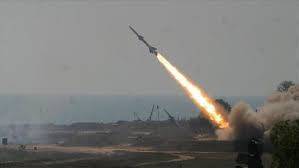Saudi Arabia intercepts ballistic missiles, drones fired from Yemen

Stay tuned with 24 News HD Android App

Saudi authorities said they intercepted three ballistic missiles fired from neighbouring Yemen that had targeted civilians in the Eastern Province as well as the southern cities of Najran and Jazan.
Debris from the interception scattered across the eastern city Dammam, injuring two children and damaging 14 homes, according to a spokesperson for the Ministry of Defense. The severity of the injuries was unclear.
"Saudi Air Defence has intercepted and destroyed (3) ballistic missiles and (3) bomb-laden drones launched by the Iran-backed Houthi militia," spokesperson Brigadier General Turki Al-Malki said in a statement, calling it "brutal, irresponsible behavior" by the Huthi rebels in Yemen.
The Saudi-led coalition fighting the rebels told state-run television it would take "strict measures" to protect civilians.
While there was no immediate comment from the Huthis, the Iran-allied insurgents have repeatedly targeted the kingdom in cross-border attacks.
In August, the rebels escalated operations using unmanned aerial vehicles and missiles, and Saturday's interception comes four days after a drone hit Abha International Airport in the south, wounding eight people and damaging a civilian plane.
It also comes a few hours before Hans Grundberg, the UN's new envoy for Yemen, officially assumes his duties Sunday.
In Dammam, Twitter users reported hearing a loud explosion.
Eastern Saudi Arabia is home to major oil infrastructure. A previous attack in September 2019 temporarily halted half of the kingdom's oil production.
Saudi Arabia intervened in the Yemen war on behalf of the internationally recognised government in 2015, shortly after the Huthis seized the capital of Sanaa.
Yemen's grinding conflict has claimed tens of thousands of lives and displaced millions, resulting in what the United Nations calls the world's worst humanitarian crisis.
While the UN is pushing for an end to the war, the Huthis have demanded the reopening of Sanaa airport, closed under a Saudi blockade since 2016, before any ceasefire or negotiations.
65 dead in fighting for Yemen's Marib
Sixty-five combatants have been killed in fighting after Yemen's Huthi rebels renewed an offensive on Marib, the last government stronghold in the country's oil-rich north, a military official said Thursday.
The Iran-backed rebels attacked pro-government positions south of the strategic city, making progress despite losing dozens of fighters in coalition air strikes.
It was the Huthis' first major offensive on Marib, the key to controlling the region, since June, when 111 fighters on both sides died in three days of clashes.
"Twenty-two pro-government (forces) were killed and 50 others were wounded, while 43 Huthi rebels were also killed in the last 48 hours," a government military official told AFP.
The figures were confirmed by other military and medical sources.
The resurgence in fighting comes after strikes on Yemen's largest airbase, in the country's south, killed at least 30 pro-government fighters on Sunday in the deadliest incident since December.
It also comes just days before the United Nations' new special envoy for Yemen, Swedish diplomat Hans Grundberg, takes up his duties.
Yemen's internationally recognised government -- backed by a Saudi-led military coalition -- and the Huthis have been locked in war since 2014, when the insurgents seized the capital Sanaa.
In February, the Huthis escalated their efforts to take Marib in fighting that has killed hundreds on both sides. Control of the oil-rich north would strengthen the Huthis' bargaining position in peace talks.
While the UN and Washington are pushing for an end to the war, the Huthis have demanded the re-opening of Sanaa airport, closed under a Saudi blockade since 2016, before any ceasefire or negotiations.
- Alleged war crimes -
As well as the bloody offensive in Marib, the Huthis have also stepped up drone and missile strikes on Saudi targets, including its oil facilities.
Eight people were wounded on Tuesday in the latest such drone attack that also damaged a civilian plane and the entrance to Abha airport in southwest Saudi Arabia.
In June, then UN envoy for Yemen Martin Griffiths told the Security Council that his efforts over the past three years to end the war had been "in vain".
The fighting has killed tens of thousands and left some 80 percent of Yemenis dependent on aid, in what the UN calls the world's worst humanitarian crisis.
The war has also displaced millions of people and left many on the brink of famine.
On Monday, lawyers representing victims of the conflict made a submission to the International Criminal Court for an investigation into alleged war crimes and crimes against humanity by pro-government forces.
The allegations centre on a 2016 coalition air strike that killed 140 people at a funeral in Sanaa, and a 2018 air strike on a school bus in northern Yemen that killed at least 40 children.
The coalition has admitted that "mistakes" were made, and said it would put on trial military personnel suspected of being behind strikes on civilians, including the school bus strike.
The ICC, in The Hague, has no obligation to consider complaints filed to the prosecutor by individuals or groups.
